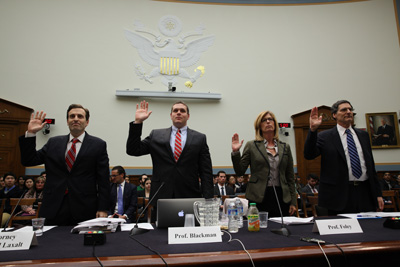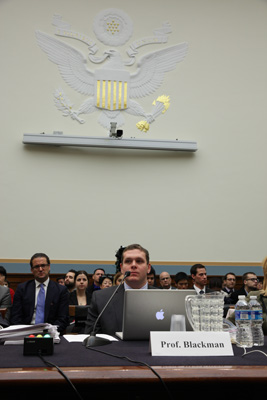The Wall Street Journal published an Op-Ed co-authored by Ilya Shapiro and me on our amicus brief in King v. Burwell. In honor of the 800th anniversary of Magna Carta, and the fact that the lead Plaintiff is named “King,” we struck a fitting rule of law theme. It is titled, “A Litmus Test for ObamaCare and the Rule of Law.” The Op-Ed discusses the many ways that the ACA has been modified, delayed, and suspended, at a whim.
Here is the opening:
This spring will mark the 800th anniversary of the signing of the Magna Carta, the landmark agreement by King John of England at Runnymede ceding certain rights to rebel barons. Liberty will have another chance to shine on Wednesday when the Supreme Court hears a case with momentous implications about another sort of executive power. In this instance, though, it is the rebels who have the royal name: King v. Burwell raises questions about how President Obama has enforced the ObamaCare law—or, more precisely, modified, delayed and suspended it.
This case isn’t about statutory interpretation, but the rule of law itself:
Executive lawmaking of this sort poses a severe threat to the separation-of-powers principles enumerated in the Constitution. The president has acted on the belief that legislative gridlock allows him to transcend his constitutional limits. A ruling that upholds this behavior would set a dangerous precedent for the nascent health-care law, which will be implemented for years to come by administrations with different views. More troubling, such a precedent could license virtually any executive action that modifies, amends or suspends any duly enacted law.
King, which the Supreme Court is expected to decide in June, is thus about much more than interpreting statutory language or evaluating the “deference” that judges owe bureaucrats. It isn’t a technical debate over the finer points of administrative law; it is an existential one about the rule of law itself.
And the conclusion:
Chief Justice John Roberts was correct in 2012 when he wrote in the NFIB v. Sebelius decision that it isn’t the court’s role to “express any opinion on the wisdom of the Affordable Care Act.”
But he also correctly noted “the Framers created a Federal Government of limited powers, and assigned to this Court the duty of enforcing those limits.” The court’s duty is to be a bulwark against arbitrary rule.
This is especially true in disputes between the political branches; the judiciary thus provides the ultimate safeguard of the separation of powers. Or, as Justice Robert Jackson put it in the famousYoungstown case of 1952 that rebuked President Truman ’s unilateral seizure of steel mills: “With all its defects, delays and inconveniences, men have discovered no technique for long preserving free government except that the Executive be under the law, and that the law be made by parliamentary deliberations. Such institutions may be destined to pass away. But it is the duty of the Court to be last, not first, to give them up.”
The president has shown deliberate indifference toward the plain text of the law. The Supreme Court must strike down the IRS rule and confirm the principle that, like King John at Runnymede, all political leaders are bound by the rule of law.


